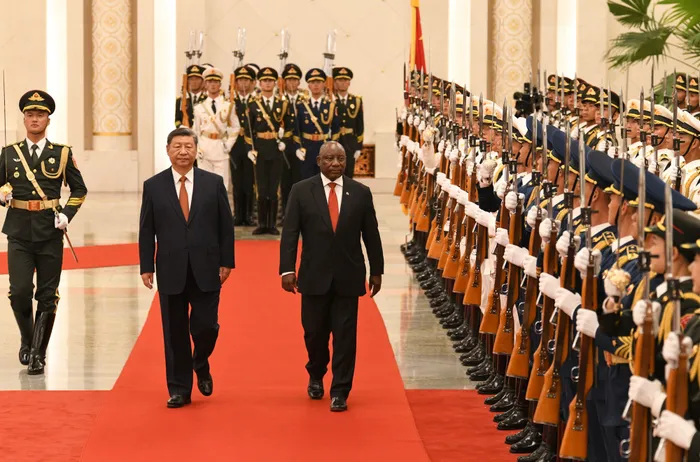SA’s Taiwan decision in line with the country’s foreign policy objectives

People's Republic of China President Xi Jinping and President Cyril Ramaphosa at the welcome ceremony of the State Visit at the Great Hall of the People in Beijing on September 2, 2024. Picture: Katlholo Maifadi/DIRCO
Dr. David Monyae
THE so-called ‘China Threat theory’ – the irrational view that the rise of China represents an existential threat to the West – is in overdrive.
A key element of the China Threat theory is the unsubstantiated narrative that China is using its power to cajole weaker and smaller countries in the Global South into adopting its political positions. The proponents of the theory see China’s hand in almost every foreign policy decision or choice made by Global South countries despite China’s consistent emphasis on non-intervention in the internal affairs of other states and respect for sovereignty as some of its cardinal foreign policy principles.
The latest manifestation of the ‘China Threat theory’ is the tantrum thrown by the West and its mouthpieces on the South African government’s decision to request that Taiwan move the Taipei Liaison Office from the country’s administrative capital, Pretoria, to the commercial hub, Johannesburg.
South Africa’s Department of International Relations and Cooperation (DIRCO) said that upon moving to Johannesburg the office will be rebranded a Trade Office which “will be a true reflection of the non-political and non-diplomatic nature of the relationship between the Republic of South Africa and Taiwan.” This decision was taken in the context of South Africa having severed formal diplomatic relations with Taiwan in 1997 following the government’s acknowledgement of the One China policy.
Having both the Chinese embassy and the Taipei Liaison Office in the capital would seem to be undermining the One China policy. South Africa has always reiterated its respect and support for the One China policy. When President Cyril Ramaphosa paid a state visit to China last month, he stated that South Africa remains “firmly committed to One China policy” under the banner of progressive internationalism. South Africa and China upgraded their relationship from a Comprehensive Strategic Partnership to an All-Round Strategic Cooperative Partnership in a New Era reflecting the increasing mutual strategic importance that both countries attach to each other.
The DIRCO said asking Taiwan to move its offices to Johannesburg was consistent with standard diplomatic practice that official foreign embassies and high commissions are hosted in the capital city. In its response, the Chinese government welcomed South Africa’s decision to move Taiwan’s office to Johannesburg. China’s Ministry spokesperson, Mao Ning, said “We commend South Africa’s right decision to move the Taipei Liaison Office in South Africa outside the administrative capital, Pretoria”. She continued by saying that Taiwan’s claims of independence have no support and will ultimately fail.
South Africa’s move has been unnecessarily and unduly politicised. While it is clearly in line with the country’s foreign policy towards China which has the One China policy as one of its central principles, the move has been bizarrely interpreted as South Africa bowing to Chinese pressure.
This has also triggered a response from US politicians. A US Senator, Marsha Blackburn said that the US should not tolerate this behaviour from South Africa. Rather shockingly, the Senator urged the US government to “to make it clear that there will be consequences if South Africa works with the CCP (Chinese Communist Party) to bully Taiwan, including removing South Africa from the AGOA trade program.”
The Africa Growth and Opportunity Act (AGOA) is a piece of US legislation which grants selected African countries free access to the US market on a wide range of products. South Africa exports almost US$3 billion worth of goods under the programme. The US has not hesitated to weaponize the AGOA to force African countries to toe its line.
The unfortunate expressions from a high-ranking US politician expose the US for doing what it accuses China of doing: interfering in the foreign policy choices of an independent and sovereign state. This is not new. The US has strongly criticised South Africa’s positions on the Russia-Ukraine war and the Israel-Palestine conflict brandishing the same stick of withdrawing South Africa’s participation in AGOA.
This use of undue unilateral influence to alter the foreign policy of an independent country is a violation of international norms. This stems from the broader China Threat theory of which the US is a major proponent. The US views the geopolitical landscape from the lens of its zero-sum geopolitical competition with China. Even innocent foreign policy choices are interpreted in Washington in terms of the relative balance of international influence between the US and China.
South Africa and China’s relationship has thrived even as the Taiwan Liaison Office remained in Pretoria. It is baffling why some would insinuate that China pressured South Africa into requesting Taiwan to move its offices to Johannesburg. Why now after 26 years of official diplomatic relations?
* Dr. David Monyae is the Director of the Centre for Africa-China Studies at the University of Johannesburg
** The views expressed in this article do not necessarily reflect the views of The African
Related Topics: